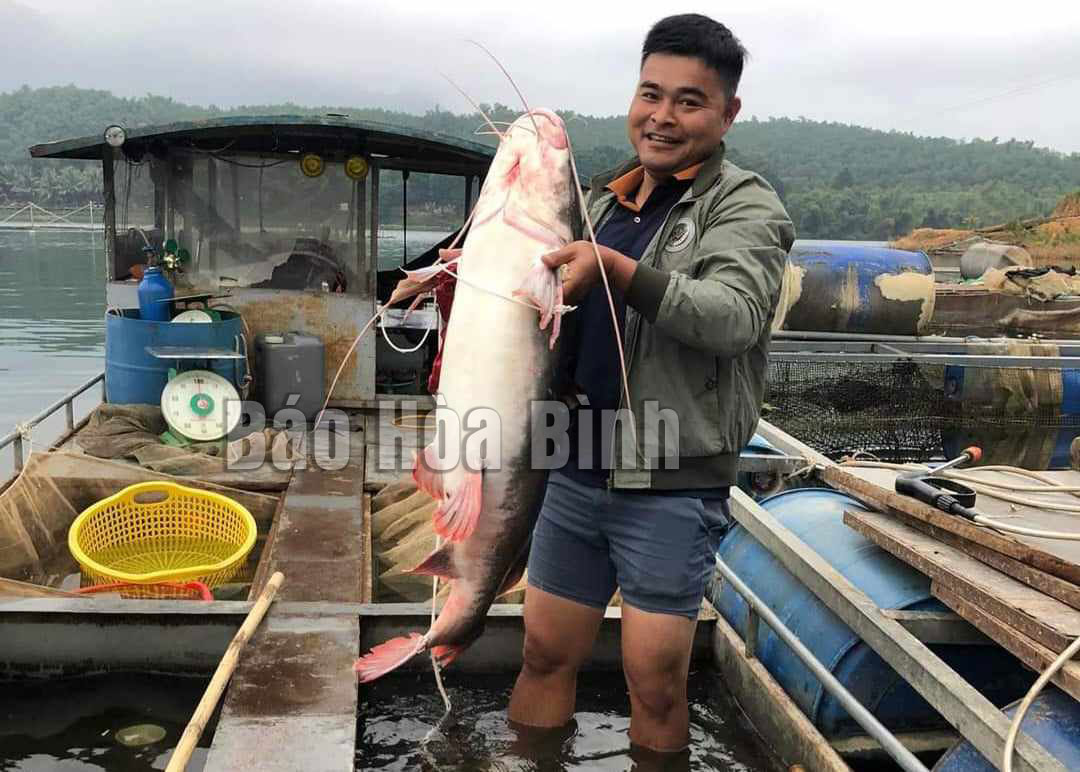
(HBO) - Fish farming has effectively changed the lives of many families in Vay Nua commune of Da Bac district. Taking advantage of the clean water in the lake bed, local residents have switched from fishing to fish farming for a stable source of income.

Cage fish farming
contributes to changing the lives of people in Vay Nua commune, Da Bac
district.
Sang Bo hamlet pioneers in caged fish farming in Vay Nua
commune. As the hamlet is like an oasis in the lake, local people have long
earned their living by planting forests, farming and fishing. When aquatic
resources become scarce, many of them think of cage farming for economic
development.
As one of the first getting involved in pisciculture in the
hamlet, Dinh Cong Son currently has more than 10 fish cages of various types.
His family is also a reliable address for supplying fries and agricultural
services to residents in Vay Nua. He shared: The fish changed the life here.
Raising fish in the lake can both take advantage of agricultural by-products
from vegetables and grass and idle workforce, and produce a steady source of
income.
Ban Van Khanh, Vice Chairman of the Vay Nua commune People's
Committee, said that the commune has more than 700 households, of which 200 are
poor. For many years, local people have lived only on afforestation, rice
farming and fishing. However, afforestation and rice cultivation in mountainous
areas give low and unstable income, and fishing is getting worse due to the
depletion of aquatic resources.
Therefore, caged fish farming is one of local people's "lifebuoy”. From
a few households, to date, five out of eight hamlets have developed fish
farming with more than 500 cages. Local people have bravely borrowed loans to
invest in farming. To date the outstanding debt of the whole commune has
reached 50 billion VND (2.1 million USD), most of which is in fish farming.
Those households are doing business effectively. As a result, the number of
poor households in the commune decreases gradually, added Khanh.
According to data from the Hoa Binh Provincial Party Committee, the industrial production index for the first six months of 2025 is estimated to have increased by 20% compared to the same period last year. This marks the highest year-on-year growth rate for this period since 2020.
In the first six months of 2025, Hoa Binh province’s export turnover was estimated at 1.145 billion USD, marking an 18.11% increase compared to the same period in 2024. Import turnover was estimated at $ 804 million, a 17.15% increase, which helped the province maintain a positive trade balance.
The lives of the ethnic minority farmers in Tan Lac district have gradually improved thanks to the new directions in agricultural production. This is a testament to the collective strength fostered through the professional associations and groups implemented by various levels of the district’s Farmers’ Union.
With the motto the "product quality comes first,” after nearly one year of establishment and operation, Muong village’s Clean Food Agricultural and Commercial Cooperative, located in Cau Hamlet, Hung Son Commune (Kim Boi district), has launched reputable, high-quality agricultural products to the market that are well-received by consumers. The products such as Muong village’s pork sausage, salt-cured chicken, and salt-cured pork hocks have gradually carved out a place in the market and they are on the path to obtaining the OCOP certification.
In the past, the phrase "bumper harvest, rock-bottom prices" was a familiar refrain for Vietnamese farmers engaged in fragmented, small-scale agriculture. But today, a new spirit is emerging across rural areas of Hoa Binh province - one of collaboration, organisation, and collective economic models that provide a stable foundation for production.
Maintaining growing area codes and packing facility codes in accordance with regulations is a mandatory requirement for agricultural products to be eligible for export. Recently, the Department of Agriculture and Environment of Hoa Binh province has intensified technical supervision of designated farming areas and packing facilities to safeguard the "green passport" that enables its products to access international markets.



